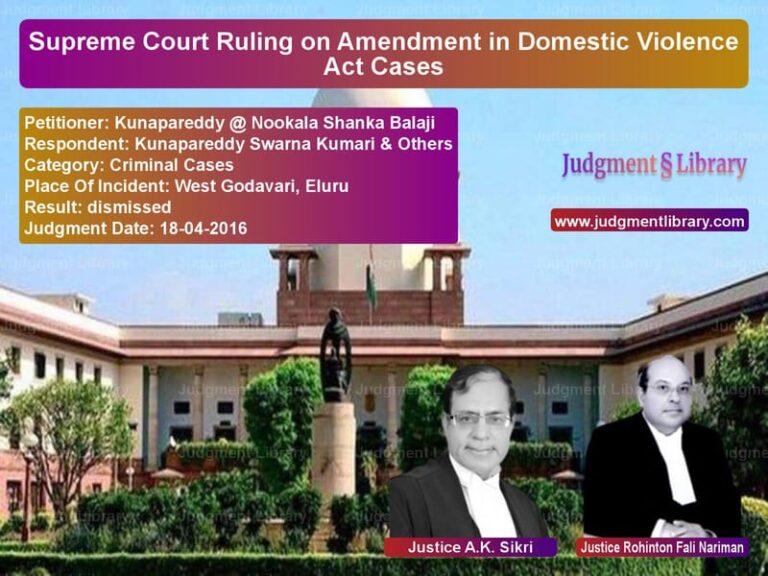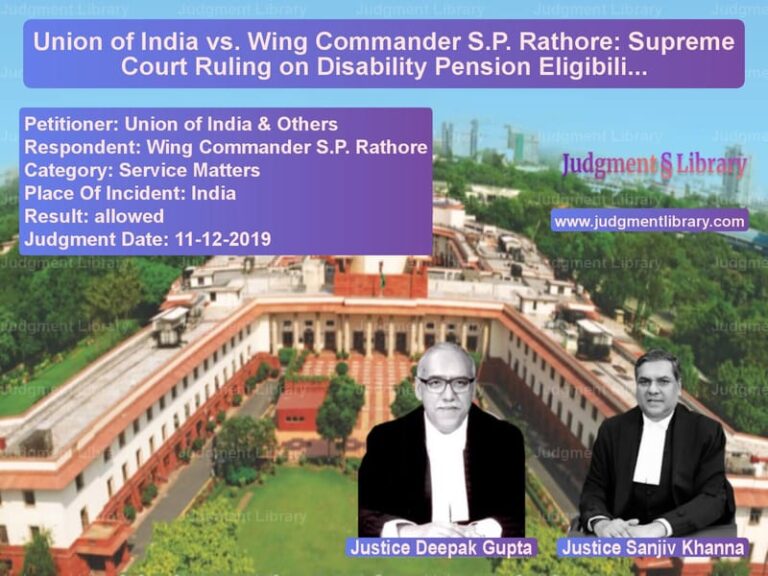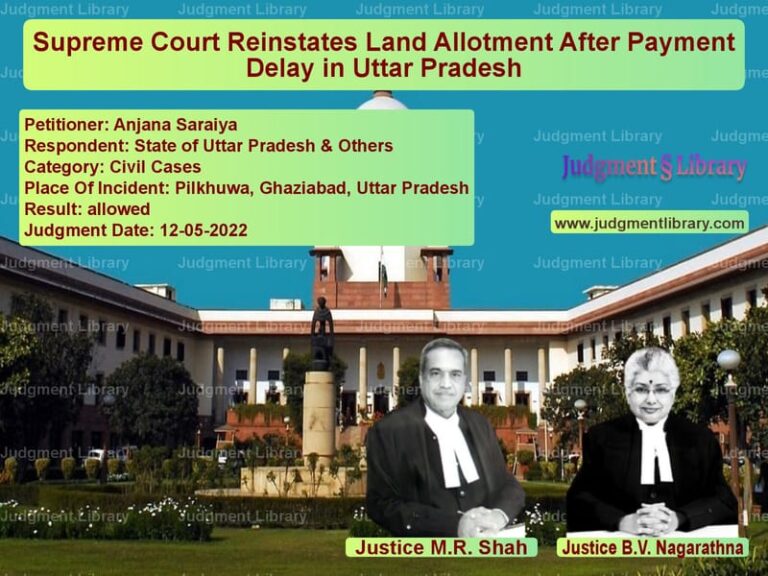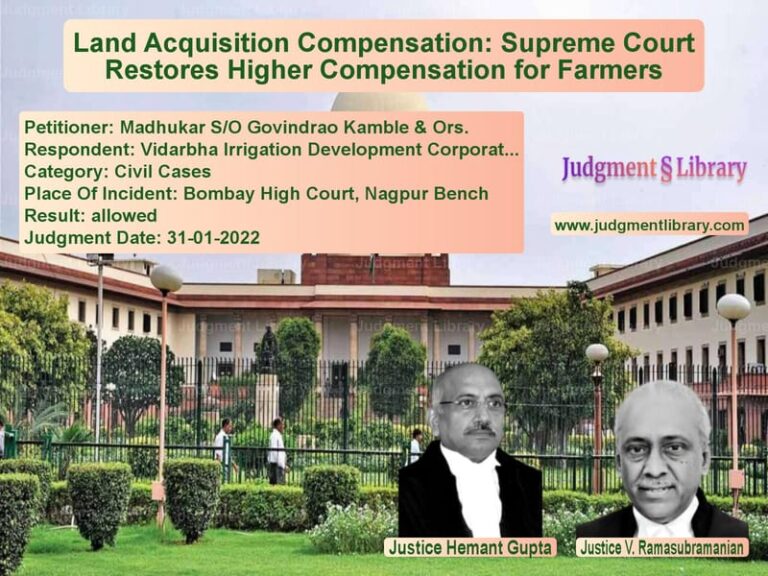Supreme Court Reinforces CBI Autonomy in Alok Verma’s Removal Case
The Supreme Court’s decision in Alok Kumar Verma vs. Union of India & Others is a landmark ruling concerning the independence of investigative agencies in India. The Court addressed critical issues related to the removal of the Director of the Central Bureau of Investigation (CBI) and the extent of executive influence over autonomous institutions. The judgment establishes essential safeguards to protect investigative agencies from undue political interference, ensuring their autonomy in conducting impartial investigations.
Background of the Case
The controversy began on October 23, 2018, when the Central Vigilance Commission (CVC) issued an order divesting Alok Kumar Verma, the then-Director of the CBI, of his powers. The Government of India supported the decision and placed him on leave. Simultaneously, the government appointed M. Nageshwar Rao as the interim Director, handing over the administration of the CBI to him. This move sparked nationwide debates over political interference in the working of India’s premier investigative agency.
The dispute arose following an internal conflict within the CBI, where Verma and the agency’s Special Director, Rakesh Asthana, accused each other of corruption. This public fallout led the government to intervene, citing the need to restore the CBI’s credibility.
Challenging his removal, Verma filed a petition before the Supreme Court, arguing that the government’s action was illegal and violated the Delhi Special Police Establishment (DSPE) Act, 1946, which governs the functioning of the CBI.
Key Legal Issues
- Whether the Central Vigilance Commission (CVC) and the Government of India had the authority to divest the CBI Director of his powers without following the due process.
- Whether such removal violated the Delhi Special Police Establishment (DSPE) Act, 1946, which requires a high-powered selection committee’s approval.
- Whether the government’s action undermined the independence of the CBI and compromised its ability to function without political interference.
- What guidelines should be laid down to prevent arbitrary removals of future CBI Directors?
Arguments by the Petitioner (Alok Kumar Verma)
- Verma argued that his removal was arbitrary, illegal, and unconstitutional, violating the procedures established under the DSPE Act.
- He asserted that the CBI’s autonomy was protected under the Vineet Narain judgment (1997), which ruled that the CBI Director could not be removed without clearance from a high-powered selection committee.
- Verma contended that the government had no statutory power to remove him from office without the consent of the Prime Minister-led committee.
- He argued that the removal was politically motivated and designed to suppress certain investigations.
Arguments by the Respondents (Union of India & CVC)
- The government maintained that Verma’s removal was necessary due to the internal crisis within the CBI, which had damaged public confidence in the agency.
- They contended that the CVC had jurisdiction under the CVC Act, 2003, to recommend disciplinary action against the CBI Director.
- The respondents also argued that the decision was made in the public interest and was not politically motivated.
- They further contended that Verma’s refusal to cooperate with CVC investigations justified his removal.
Supreme Court’s Observations
The Supreme Court, comprising Chief Justice Ranjan Gogoi, Justice Sanjay Kishan Kaul, and Justice K.M. Joseph, delivered a landmark ruling emphasizing the necessity of protecting the autonomy of investigative agencies.
The Court made the following key observations:
- “The Rule of Law is the bedrock of democracy. However, firmly entrenched the principle may be, it gets tested in myriad situations that confront the courts from time to time.”
- “The CBI Director cannot be removed arbitrarily. The DSPE Act explicitly mandates that any transfer or removal requires the approval of a Selection Committee consisting of the Prime Minister, the Chief Justice of India, and the Leader of the Opposition.”
- “The legislative intent behind insulating the office of the CBI Director is to protect the agency from extraneous influences.”
- “If the executive is allowed to remove the CBI Director without following due process, it would render the agency vulnerable to political interference.”
Final Verdict
The Supreme Court ruled:
- The removal of Alok Kumar Verma was illegal and quashed the CVC’s order.
- Verma was reinstated as the CBI Director but with restrictions on making major policy decisions.
- The government was directed to refer Verma’s case to the high-powered selection committee, which alone had the authority to decide his fate.
- The judgment set a precedent that future removals of the CBI Director must strictly follow the provisions of the DSPE Act.
Implications of the Judgment
- The ruling strengthens the independence of the CBI by ensuring that its Director cannot be removed arbitrarily by the executive.
- It serves as a precedent for protecting investigative agencies from political influence.
- The verdict reinforces the doctrine of separation of powers, ensuring that the judiciary acts as a safeguard against executive overreach.
- The judgment underscores the importance of adhering to the statutory framework governing key institutions.
This landmark ruling ensures that the CBI, as India’s premier investigative agency, remains autonomous and free from political pressure, upholding the principles of democracy and the rule of law.
Petitioner Name: Alok Kumar Verma.Respondent Name: Union of India & Anr..Judgment By: Justice Ranjan Gogoi, Justice Sanjay Kishan Kaul, Justice K.M. Joseph.Place Of Incident: India.Judgment Date: 08-01-2019.
Don’t miss out on the full details! Download the complete judgment in PDF format below and gain valuable insights instantly!
Download Judgment: Alok Kumar Verma vs Union of India & Anr Supreme Court of India Judgment Dated 08-01-2019.pdf
Direct Downlaod Judgment: Direct downlaod this Judgment
See all petitions in Fundamental Rights
See all petitions in Constitution Interpretation
See all petitions in Legislative Powers
See all petitions in Public Interest Litigation
See all petitions in Separation of Powers
See all petitions in Judgment by Ranjan Gogoi
See all petitions in Judgment by Sanjay Kishan Kaul
See all petitions in Judgment by K.M. Joseph
See all petitions in allowed
See all petitions in Quashed
See all petitions in supreme court of India judgments January 2019
See all petitions in 2019 judgments
See all posts in Constitutional Cases Category
See all allowed petitions in Constitutional Cases Category
See all Dismissed petitions in Constitutional Cases Category
See all partially allowed petitions in Constitutional Cases Category







